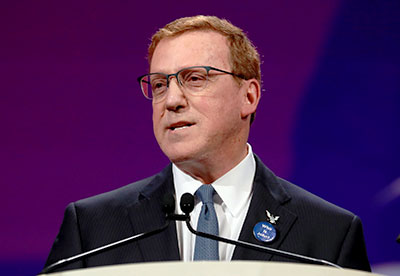Levin Speaks to Future of a 'Noble' Profession

The 2019 APA Annual Meeting is a celebration of our past but also a blueprint for the future, said APA CEO and Medical Director Saul Levin, M.D., M.P.A., in his Opening Session address.
Levin invited meeting participants to attend the sessions in the 175th Anniversary History Track. “Four special sessions will give a broad overview of the evolution of our understanding of mental illness and show how psychiatry has transformed from its beginnings in the colonial era to the present,” Levin said. “The other eight sessions will trace the history of minority/underrepresented populations of psychiatrists and patients that also make up the fabric of our shared history. Each one of us here today is a product of that history, and the work we do here during the meeting will be the foundation upon which the future of mental health care and our own legacy is built.”
He said that in the past year APA has responded to the challenges facing American medicine by adapting to new technologies and the demand for new models of care and collaborating with physicians in other specialties.
“We psychiatrists are educated to the top of our profession and speak for the health and complexity of those with mental illness and substance use disorders,” Levin said. “No one can do this as comprehensively [as] psychiatrists. For all the progress we’ve made, there are still some areas where we must improve as we work toward our next milestones—the 200th and 225th anniversaries.”
Levin recalled a recent visit to India, where he attended the Indian Psychiatric Society’s meeting. He was particularly touched by a presentation by Bharat Vatwani, M.B.B.S., titled “The Wandering Mentally Ill Destitute.” Vatwani was one of two Indians awarded the 2018 Ramon Magsaysay Award for his work with mentally ill street people.
Vatwani made an impassioned plea to leaders and psychiatrists and other physicians and the communities within India to “see and acknowledge in his country those with mental illness who wander the streets, bereft of treatment, family, safe haven of housing, or a sense of community [and] who are often in poor health,” Levin said.
Levin said Vatwani showed images of those who had received treatment and returned to their families and the villages they had had to leave. He said images showing the community celebrating and embracing the newly recovered child brought tears to the eyes of an entire audience of psychiatrists.
“We face the same issues in the United States, including here in San Francisco, which has one of the largest homeless populations in the country, with numbers approaching 8,000.”
But the future is promising. And in comments specifically addressed to APA’s aspiring and newest psychiatrists—medical students, residents, and early career psychiatrists—he said that he envied the treatments, procedures, and even cures that they will have in their physician’s medical bag in the future.
He added, “I am confident that in 25 or 50 years, there will be very few of the ‘wandering mentally ill destitute’ still on our streets.”
But APA will still be fighting to make America an ever more caring nation and a healthier one. “At this 175th Anniversary meeting, I think we will all be reminded why we entered this noble profession.” Levin said.
(Image: David Hathcox)
|
|
|
|
|

